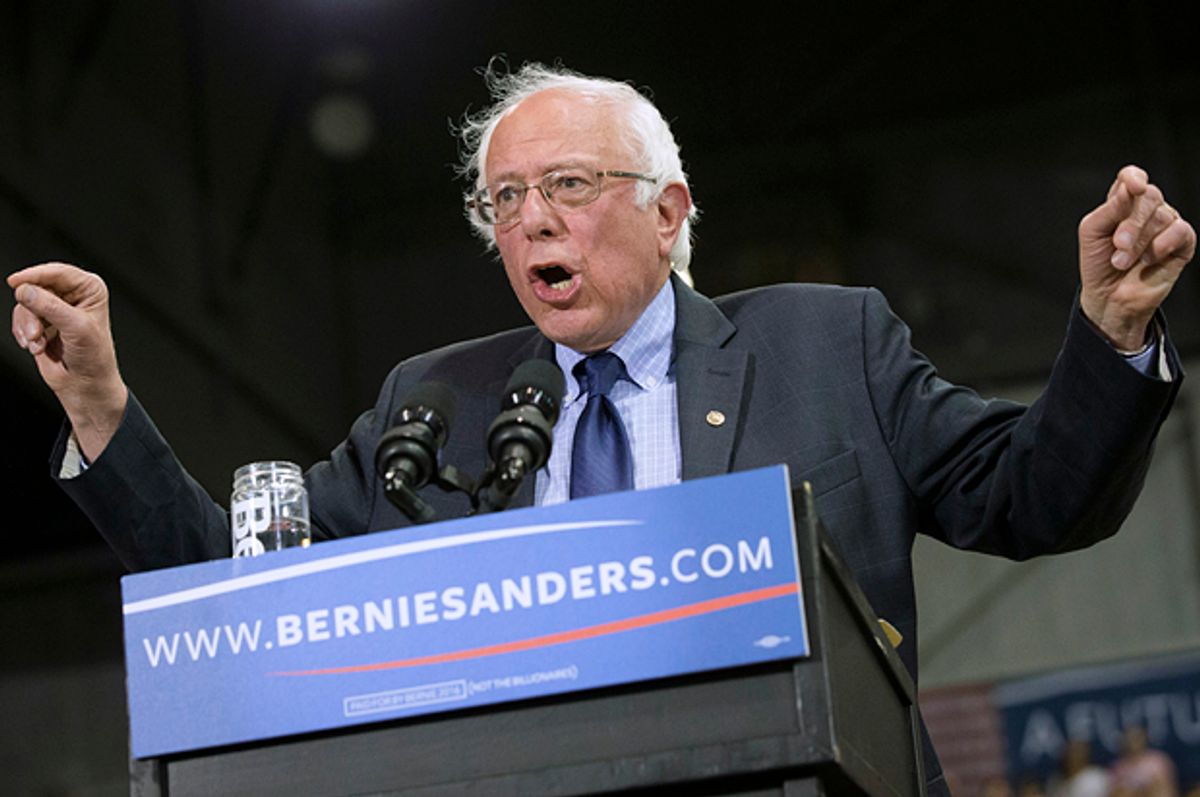Bernie Sanders won't be the Democratic nominee for president. Anyone not blinkered by fandom will readily admit that. Clinton has locked up over 90 percent of the delegates she needs to clinch the nomination, and she'll easily acquire the rest. I've supported Sanders candidacy from the beginning, and still believe he'd make a better president than Clinton or Trump or any other candidate in the now-empty field. But the race is effectively over, and I've even encouraged Sanders supporters to vote for Clinton in November.
The question now is, what should Sanders do? More to the point, what should his priorities be moving forward?
As early as two months ago, leading Democrats were implying that Sanders should bow out or at the very least focus his attacks on Trump, not Clinton. “What's important is not whether or not he gets out, but how he campaigns,” said Sen. Claire McCaskill, a longtime Clinton supporter. “If the contrast is now about what separates us from Donald Trump, then I think it's fine. I just hope we can begin to focus on unifying.” “It will be almost impossible for Sen. Sanders to catch up,” Sen. Barbara Mikulski said. “And he should do the math and draw his own conclusions.”
David Wade, a former communications strategist for John Kerry in 2004, wrote a piece for Politico Wednesday morning making similar noises about Sanders. “When he first decided to run for president,” Wade writes, “Bernie Sanders had a goal in mind: to start a political revolution by getting big money out of politics. If he wants to do it – if Sanders wants to build a lasting movement to fight money's outsize influence – he has to close one door to open another. The transition from contender to gracious supporter of the nominee isn't easy for any presidential candidate, but he needs to make it, and soon.”
Sanders's “zombie candidacy,” as Wade puts it, is accomplishing nothing save for the erosion of Clinton's reputation. “I've seen up close how much damage this sort of prolonged 'zombie' candidacy can inflict on the eventual nominee – and what's ultimately at stake for the country.” By staying in the race, the argument goes, Sanders is forcing Clinton to “squander vast amounts of time” and thus draining her campaign of its most precious resource. Although he concedes the prolonged primary wasn't the reason Kerry lost, he insists the “needlessly hard shots” from the campaigns of Dean, Clark, and Edwards did lasting damage to Kerry's general election candidacy.
Wade even has a little advice for Sanders, from one Democrat to another: “Sanders has a stake in this. I hope he sees it. Sanders needs to think long and hard about the big cost of criticizing the now-prohibitive Democratic front-runner. He didn't set out to become Trump's best ghostwriter for the general election, but that is the role continued attacks on Clinton risk earning him.”
This is becoming tedious. The notion that Sanders has some transcendent obligation to Clinton or the Democratic Party is misguided. He exists because the Democratic Party made him necessary. They've ignored the progressive base for years and Sanders's candidacy is a healthy, democratic response to that. He represents an under-served wing of the party, and he has every right to continue campaigning on their behalf until the last primary is held, just as Clinton did in 2008. Every democratic primary voter in every state deserves an opportunity to cast their vote.
Embedded in these calls for Sanders to exit is a false assumption that he can't distinguish himself from Clinton while also insisting she's a better option than Donald Trump. Indeed, this is what Sanders has done since the first debate. “On her worst day,” Sanders said, “Hillary Clinton will be an infinitely better candidate and president than the Republican candidate on his best day.” And this statement was made before Donald Trump was the presumptive nominee.
It's nonsense to argue, as Wade does, that Sanders's substantive attacks on Clinton are somehow delivering talking points to Trump and the GOP. Republicans have been assaulting Clinton for two decades – they've got their playbook already. And Trump is going to make this race as ugly and insult-riddled as possible – that's his shtick. What Sanders does or doesn't do has no bearing on that.
Sanders speaks for a significant subset of Democratic voters. He won't win, but his presence in the race is its own justification: to force Clinton to engage with the issues progressives and young voters care about. And thereby force her to take positions that those voters can hold her to in a general election. That's a good thing for the long-term viability of the party.
Sanders, therefore, can – and should – campaign until the convention, at which point he can – and will – throw his support behind Clinton.



Shares